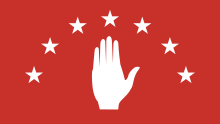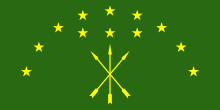Abazins
The Abazin, Abazinians or Abaza (Abaza and Abkhaz: Абаза; Circassian: Абазэхэр; Russian: Абазины; Turkish: Abazalar; Arabic: أباظة), are an ethnic group of the Northwest Caucasus, closely related to the Abkhaz and Circassian people. They live mostly in Turkey, Egypt and in Karachay-Cherkessia and Stavropol Krai in the North Caucasus region of Russia. The Tapanta (ru:Тапанта), a branch of the Abaza, lived between the Besleney and Kabardian princedoms on the upper Kuban.
 Flag of the Abazin | |
| Total population | |
|---|---|
| ~150,000 (est.) | |
| Regions with significant populations | |
| 15,000–50,000[1] | |
| 50,000[2] | |
| 43,341 36,919 3,646 418 | |
| 128[3] | |
| Languages | |
| Abaza, Russian, Arabic, Turkish | |
| Religion | |
| Predominantly Sunni Islam | |
| Related ethnic groups | |
| Abkhazians, Circassians | |
The Abazin originally inhabited the Sadzen region in the western part of Abkhazia and migrated from Abkhazia to Abazinia in 14th and 15th centuries. They later migrated to various regions of the former Ottoman Empire in the 18th and 19th centuries. Since the late 18th century, their dominant religion is Sunni Islam (Hanafi).
Abaza people speak the Abaza language, a Northwest Caucasian language closely related to Abkhaz and Circassian. There are two dialects of Abaza spoken in Karachay-Cherkessia: Ashkharua and Tapanta. The culture and traditions of the Abazin are similar to those of the Circassians. On many old maps Abazin territory is marked as part of Circassia (Adygea).
According to the 2010 Russian census, there were 43,341 Abazins in Russia.
Diaspora
An Abazin diaspora exists in Turkey,[1] Egypt[2] and in Middle Eastern countries such as Jordan and Syria, most of which are descendants of muhajirs from the Caucasian War with the Russian Empire.
There is a significant Abazin presence in Turkey. An estimated 150,000 Abaza live in the provinces of Eskişehir, Samsun, Yozgat, Adana and Kayseri. Most of them belong to Ashkharua clan that fought against the Tsarist army and emigrated to Turkey after losing the battle of Kbaada (Krasnaya Polyana in today's Sochi), whereas the Tapanta clan fought with the Russian forces.
A prominent example in Egypt is the Abaza family, a large Abazin clan.[4] The Abaza family still holds to this day an élite place in Egyptian society and constitutes Egypt's largest family, with well over 15,000 members active in all aspects of society.
See also
- Abaza in Egypt
- Abazinia
- Abazinsky District
References
- Ethnologue.com
- Websters-online-dictionary
- "About number and composition population of Ukraine by data All-Ukrainian census of the population 2001". Ukraine Census 2001. State Statistics Committee of Ukraine. Archived from the original on 17 December 2011. Retrieved 17 January 2012.
- الكاتب, الكاتب (September 28, 1998). "Arabs or Circassians, or a combination of both? Alobazah families in Egypt" (in Arabic). Al Hayat News. Archived from the original on 2016-12-27. Retrieved 6 December 2016.
